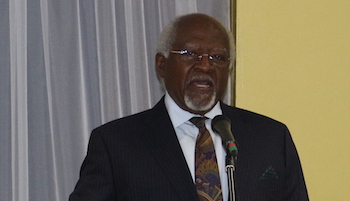
Source: Philip Fine, Medicine Focus
Jamaican-born Julius Garvey, BSc’57, MDCM’61, remembers his nine years in Montreal fondly.
He forged lasting friendships, learned the “winter dash,” and overcame his fear of public speaking.
The son of orator, activist and social entrepreneur Marcus Garvey, a leading proponent of black nationalism and Pan-Africanism in the early 20th century, Julius also enjoyed arguing politics in the multicultural milieu of McGill University.
“I love Montreal,” says the 84-year-old still-practicing cardiothoracic and vascular surgeon.
Julius, who lives in New York, returned to Montreal in October, as a special guest of the Jamaica Association of Montreal (JAM) at its annual Heroes Banquet. He was recognized for his efforts to preserve his father’s legacy, notably Justice4Garvey, a campaign that made international headlines last year.
In 1914, Marcus Garvey founded the Universal Negro Improvement Association and African Communities League (UNIA-ACL) to “work for the general uplift of the people of African ancestry of the world.” By the 1920s, the UNIA-ACL counted six million members in 40 countries. It sent representatives from the United States to Liberia to investigate the possibility of establishing the country as a homeland for the African diaspora.
Under the UNIA-ACL, Garvey also launched a cooperative business, the Black Star Line Shipping Company, intended to travel between Africa, the Caribbean and North America, fostering an independent global black economy.
Garvey’s message of black separatism, although it struck a chord with many, also garnered criticism from other black leaders of the time, such as W.E.B. Du Bois. It also attracted the attention of a young J. Edgar Hoover.
Hoover, then head of the “anti-radical division” of the Bureau of Investigation, a precursor to the Federal Bureau of Investigation, accused Garvey of “agitating the negro movement.” The Bureau’s first-ever black agents were hired to infiltrate the Black Star Line.
Shortly thereafter, Garvey’s career was derailed by a charge of mail fraud that Julius maintains was politically motivated. An all-white jury found Garvey guilty. Three years into a five-year prison term, his sentence was commuted by President Calvin Coolidge, and he was deported to his native Jamaica.
From Jamaica and, later, England, Garvey continued to be politically active, but he no longer enjoyed the same reach. He died when Julius, his younger of two sons, was only seven.
Julius was raised by his mother, Amy Jacques Garvey, in Kingston. Amy pushed Julius to excel academically and follow in his father’s footsteps. “She’d say ‘You have to be like your father. You can’t let the Garvey name down,’” Julius says, adding that the pressure never stopped him from enjoying cricket, his favourite sport: “That was one of the reasons why I didn’t want to leave Jamaica.”
A good student in math and physics, Julius’s work in a diagnostics lab led him to consider medicine, and two years away from school allowed him to mature. Then he heard about McGill from a friend of a friend.
“How should I put it? There was a feeling that McGill was favourable to people from the Caribbean.” And off he went. His first year, he roomed with two Jamaican friends in the Côte-des-Neiges neighbourhood, catching the tramway to downtown. The next winter, they decided to rent an apartment much closer to campus so they could run quickly to classes on those frigid mornings.
Heat came in the form of a steamy club run by Haitians that he’d frequent and the debates he had both inside and outside the Debating Society. The world was changing, and he enjoyed hearing stories from the African students he would meet. He also played cricket with his fellow West Indians and even represented Canada in a game against England.
He says Dr. Wilder Penfield was the big name at the time at McGill, which inspired him to look into neurology and psychiatry, but he meant to go home to Jamaica and thought a cardiac specialization would prove more practical. He would end up doing surgical rotations at the Royal Victoria Hospital, the Montreal General Hospital and the Montreal Children’s Hospital. He left in 1962 for New York’s Mount Sinai Hospital and went on to have a thriving career, most notably teaching at Columbia University and serving as Chief of Thoracic and Vascular Surgery at Queens Hospital Center.
More recently, Julius led a push to have his activist father posthumously pardoned by Barack Obama before the US president’s departure from office. This bid was unsuccessful despite having the support of the entire Congressional Black Caucus.
Martin Luther King, in a 1965 speech, called Marcus Garvey “the first man of colour in the history of the United States to lead and develop a mass movement.” JAM President Michael Smith puts it simply: “He’s one of our national heroes.”
Smith happened upon Julius speaking on the radio during the time of the campaign for the pardon, Justice4Garvey. He immediately contacted him and was thrilled to find the Montreal connection.
Julius, who still cherishes the copy of A Way of Life by Sir William Osler, MDCM 1872, that he received in Med-2, took advantage of his visit to Montreal to see friends and reminisce about his time as a student. “Those were my best cricketing days,” he says, laughing.
February 1, 2018
